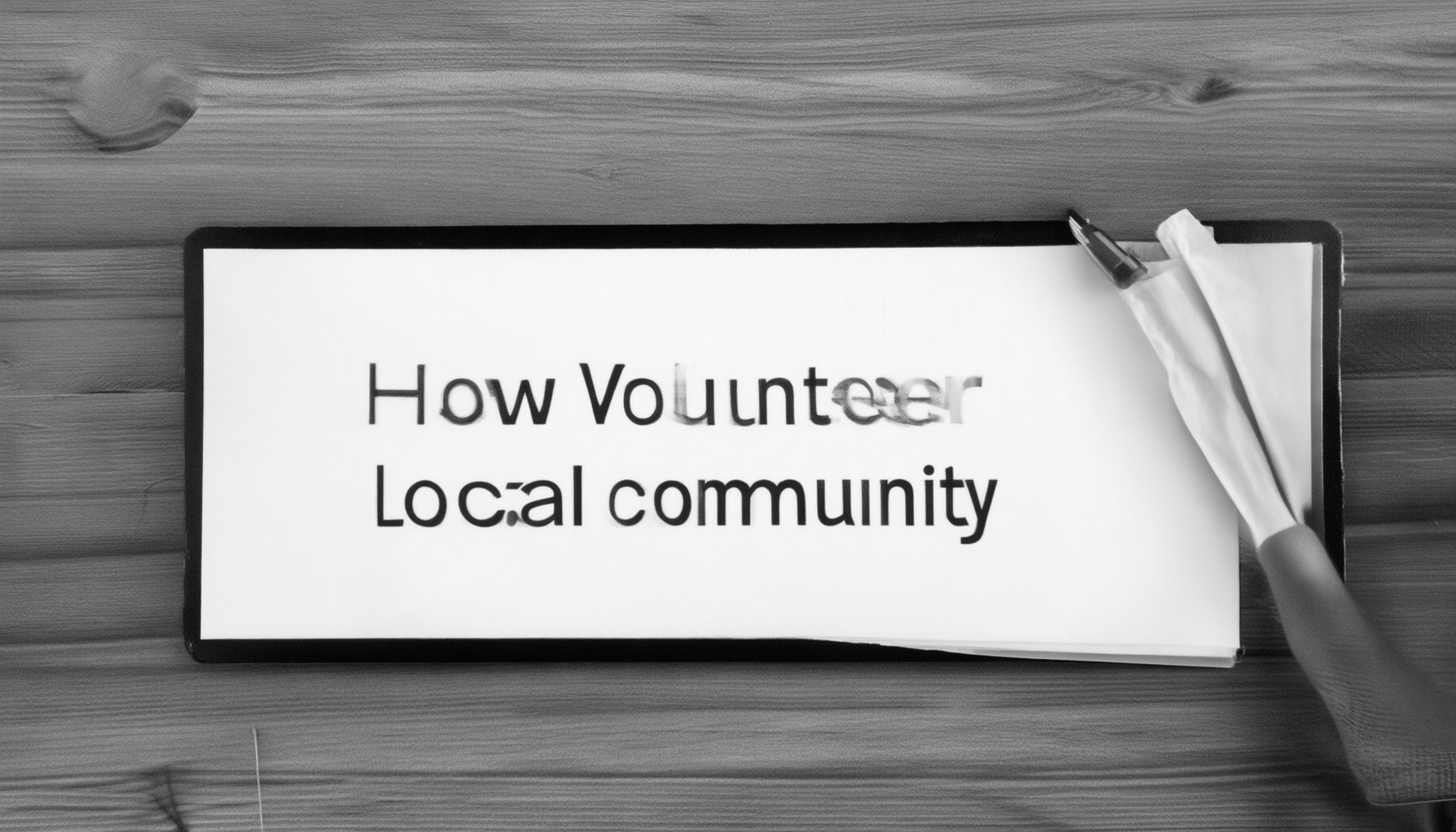Volunteering in your local community offers a rewarding opportunity to connect with others, strengthen your neighborhood, and make a meaningful impact. Whether you’re a student, a professional, or a senior, there are countless ways to contribute your time and skills. From organizing community events to assisting at local shelters, volunteering allows you to directly support those in need while building lasting connections. But how do you get started? Explore volunteer opportunities near you through online platforms or local organizations, and discover how you can make a difference right in your own backyard. This guide will walk you through everything you need to know, ensuring you find the perfect volunteer role for you.
Key Takeaways
– Volunteer Your Time and Skills: Leverage your skills by volunteering at local shelters or community centers.
– Support Local Businesses: Shop locally and help sustain your community by supporting small businesses.
– Get Involved in Environmental Efforts: Join community clean-up initiatives to improve your local environment.
– Educate and Share Knowledge: Host workshops or tutor locals to empower your community.
– Advocate for Community Issues: Use your voice to raise awareness on important local matters.
– Engage in Arts and Culture: Participate in cultural events to celebrate diversity and foster connections.
– Promote Health and Wellness: Organize fitness events or volunteer at health fairs to promote well-being.
– Mentor Others in Your Community: Mentor youth or professionals to inspire future leaders.
– Foster Community Unity: Plan gatherings to bring your community together.

How to Volunteer in a Local Community
Volunteering in your local community can be a rewarding experience that benefits both you and those around you. Here’s a step-by-step guide to getting started:
- Step 1: Find Volunteering Opportunities
- Visit local volunteer centers or organizations. These are great places to start as they often connect volunteers with meaningful roles.
- Check online platforms that list local volunteering opportunities, such as Inxchan’s volunteer portal .
- Ask at local non-profits, schools, or religious institutions if they need help.
- Step 2: Identify Your Interests and Skills
- Think about what you’re passionate about. Whether it’s working with kids, helping the elderly, or organizing events, align your efforts with your interests.
- Consider your skills. Are you good at communication, organization, or hands-on tasks? Match these with volunteer roles that need them.
- Step 3: Prepare for Volunteering
- Research the organization or cause you’ll be volunteering for. Understand their mission and goals to ensure it’s a good fit.
- Reach out to the organization to express your interest. Most groups appreciate proactive individuals.
- Familiarize yourself with their expectations and any training they may require.
- Step 4: Get Started and Stay Involved
- Once you’ve been matched or assigned a role, attend orientation sessions if available.
- Communicate regularly with your supervisor or point person to stay updated on tasks and expectations.
- Be open to feedback and willing to learn. Volunteering is about growth and development as well as giving back.
- Step 5: Explore Specialized Areas
- If you’re interested in a particular field, such as education or healthcare, look for specialized volunteer programs.
- Consider long-term commitments for greater impact, though short-term projects can also be fulfilling.
Community Volunteer Activities
Community volunteer activities are initiatives where individuals contribute their time, skills, and effort to support and enhance the well-being of their local community. These activities aim to address community needs, foster social connections, and create a positive impact through collective action.
Types of Community Volunteer Activities
- Environmental Conservation: Initiatives focused on preserving and restoring the environment, such as tree planting, beach cleanups, and park maintenance.
- Educational Support: Programs aimed at helping individuals of all ages, including tutoring students, establishing libraries, and offering adult education classes.
- Health and Wellness: Activities that promote health and well-being, such as visiting the elderly, organizing health fairs, and conducting blood donation drives.
- Arts and Culture: Projects that enrich cultural life, like mural painting, community theater productions, and art exhibitions.
- Emergency Response: Volunteering during disasters or emergencies, such as assisting with relief efforts and disaster recovery.
- Social Services: Supportive programs like operating food banks, sheltering homeless individuals, and providing clothing donations.
- Event Planning: Organizing community events, festivals, and fundraisers to raise funds for local causes.
- Technology Assistance: Initiatives to help individuals with technological challenges, such as repairing computers for seniors or teaching digital literacy.
- Animal Shelter and Wildlife Conservation: Activities involving animal welfare, such as fostering animals or participating in wildlife conservation efforts.
Benefits of Participating in Community Volunteer Activities
- Fosters a sense of belonging and community spirit.
- Creates opportunities for personal growth and skill development.
- Contributes positively to the overall quality of life in the community.
- Provides a platform for making meaningful connections and building relationships.
Getting Involved
To participate in community volunteer activities, consider reaching out to local non-profits, community centers, or religious organizations. Many of these groups actively seek volunteers and can provide guidance on how to get started. Additionally, online platforms and local boards often list volunteer opportunities, allowing you to find a cause that aligns with your interests and availability.
By dedicating your time and talents to community volunteer activities, you can make a tangible difference while gaining the satisfaction of contributing to a better world around you.

Who Needs Volunteers in Las Vegas?
In Las Vegas, there are numerous organizations and groups that actively seek volunteers to support their missions and activities. Here’s a breakdown of the primary sectors where volunteers are needed:
- Local Non-Profits : Many non-profit organizations in Las Vegas rely on volunteers to help with event planning, administrative tasks, and direct service efforts. Examples include Habitat for Humanity and the Salvation Army.
- Community-Based Initiatives : Events like marathons, festivals, and neighborhood cleanups often require additional hands. Volunteering with local community groups can be a great way to give back.
- Charitable Foundations : Foundations focused on education, health, and arts may need volunteers to assist with fundraising, event planning, and research. Notable ones include the Nevada Health Foundation and the Las Vegas Philharmonic Society.
- Local Businesses : Food banks, clothing drives, and corporate social responsibility initiatives often require volunteer support. Companies like Zappos and MGM Resorts sometimes partner with local charities for volunteer events.
- Educational and Youth Programs : Schools, after-school programs, and organizations like Big Brothers Big Sisters and the Boys & Girls Club of America need volunteers to mentor and support children and teens.
- Healthcare and Social Services : Clinics, hospitals, and shelters for the homeless rely on volunteers to assist with administrative tasks, patient support, and daily operations. Groups like the Shade Tree and Three Square are active in the area.
- Environmental and Outdoor Projects : Organizations focused on park maintenance, trail development, and conservation may need volunteers. The Las Vegas Valley Water Conservation District is one such example.
- Political Campaigns and Advocacy Groups : Local campaigns and advocacy organizations often seek volunteers for event coordination, canvassing, and office support. National groups like MoveOn and Indivisible have local chapters in Las Vegas.
If you’re looking to volunteer, consider reaching out to these organizations directly through their websites or local offices to learn more about available opportunities and how you can get involved.

How to Help Your Local Community
Helping your local community can have a profound impact on the lives of those around you while also strengthening your own sense of purpose. Here are some effective ways to get involved:
- Volunteer Your Time and Skills
- Participate in local charity events or fundraisers.
- Volunteer at food banks, shelters, or community centers.
- Offer your professional skills through pro bono or community service programs.
- Assist with neighborhood cleanup or beautification projects.
- Support Local Businesses
- Shop at local-owned stores and markets to promote economic growth.
- Purchase products from artisans and small businesses.
- Share positive reviews and advocate for local businesses online.
- Get Involved in Environmental Efforts
- Organize or participate in community clean-up drives.
- Join tree-planting initiatives to improve green spaces.
- Support recycling and waste reduction programs in your area.
- Educate and Share Knowledge
- Host workshops or classes on topics like financial literacy or DIY projects.
- Volunteer at libraries or educational centers to assist community members.
- Start a tutoring program for local students in need.
- Advocate for Community Issues
- Raise awareness about local challenges through social media or community forums.
- Attend town hall meetings or local government events to share concerns.
- Petition for improvements in housing, education, or public safety.
- Engage in Arts and Culture
- Participate in local art projects or community theater productions.
- Volunteer at cultural festivals or events to promote diversity.
- Donate to local arts organizations or museums.
- promote Health and Wellness
- Organize community fitness events or walking clubs.
- Volunteer at health fairs or clinics to provide assistance.
- Support local initiatives aimed at reducing food insecurity.
- Mentor Others in Your Community
- Be a mentor to local youth or young professionals.
- Work with local organizations to provide mentorship opportunities.
- Share your expertise through community outreach programs.
- Foster Community Unity
- Organize community gatherings like potluck dinners or BBQs.
- Volunteer to coordinate community events or festivals.
- Celebrate cultural heritage and traditions through shared activities.
Supporting Your Local Community
There are numerous ways to contribute to and strengthen your local community. Here are some organized approaches to get started:
- Volunteer:** Look for local non-profits, charities, or community organizations that align with your interests. Many groups need help with events, administrative tasks, or specific projects.
- Join Neighborhood Groups:** Participate in or start a neighborhood watch program like NeighborNetWatch to enhance community safety and build connections.
- Support Local Businesses:** Patronize local shops and services. Consider sharing their products or services on social media or attending their events to promote mutual growth.
- Organize Events:** Plan and coordinate local gatherings such as park clean-ups, cultural festivals, or educational workshops. Engage local artists and vendors to make these events successful.
- Contribute to Environmental Initiatives:** Participate in local tree-planting events or clean-up drives to improve the community’s green spaces and overall environment.
- Utilize Social Media:** Create a community Facebook group or Nextdoor page to share information, events, and needs. Keep everyone informed and engaged.
By taking initiative and dedicating time, you can positively impact your community while building meaningful connections. Start small, stay consistent, and watch your efforts grow into a thriving local environment.

What is an example of a community service?
A community service is an activity or program organized by individuals, groups, or organizations to benefit the public or society as a whole. Examples of community services include:
- Food Banks and Food Drives: Organizations that collect and distribute food to people in need, often through partnerships with local businesses and volunteers.
- Clothing Drives: Campaigns where people donate clothes, which are then distributed to shelters or those in need.
- Mentorship Programs: Initiatives where experienced individuals guide and support younger members of the community in education or career development.
- Environmental Clean-Up Efforts: Community-led projects aimed at improving the cleanliness and sustainability of public spaces, such as beach cleanups or urban renewal efforts.
These services often rely on volunteer work and collaboration between different groups within the community to achieve their goals. They play a crucial role in fostering social cohesion and addressing local needs effectively.





0 Comments